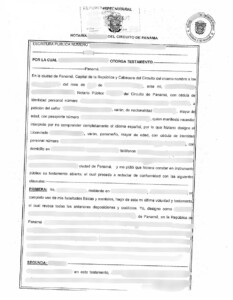The Civil Code of Panama extensively regulates wills, addressing the capacity to make a will, general rules, types of wills (holographic, open, and closed), and special wills (military, maritime, and those made abroad).
The open will is one of the most commonly used by testators in the Republic of Panama. For an open will to be valid in Panama, several essential elements must be considered, including:
- Testator’s Capacity: The testator must have the legal capacity to make a will, which means they must be of legal age and in full possession of their mental faculties. According to Article 695 of the Panamanian Civil Code, minors under 12 years old and those who are not of sound mind cannot make a will. It is advisable that elderly individuals present a mental health certificate issued by a psychiatrist to eliminate any doubts about their legal capacity to sign legal documents.
- Form of the Will: The will must comply with the formalities established by law. In the case of an open will, it must be granted before a Notary and three witnesses, who must witness the testator’s declaration of their last will. The reading of the last will and testament must take place in a single act, without interruptions.
- Content of the Will: The will must clearly express the testator’s wishes regarding the disposition of their assets. It cannot be made through a representative, as it is a personal act. According to Article 699 of the Panamanian Civil Code, a will is a unilateral act in which a person disposes of their assets after their death. Joint wills are prohibited (Article 701), meaning that two or more individuals cannot make a joint will. However, they can appoint each other as heirs in separate wills, and spouses can dispose of their assets for the benefit of their children through separate acts. If the testator does not speak Spanish, they must be assisted by two Panamanian public interpreters, and a version of the will in Spanish, along with its certified translation into the language the testator is fluent in, must also be submitted. The last will must be presented in a public instrument, which will then typically be recorded in the notary’s protocol.
- Testator’s Identification: The testator must be duly identified before the notary and witnesses, who must ensure that they possess the necessary legal capacity to make the will. Certified translators must also be identified and sign the public instrument.
- Compliance with Formalities: Any will that does not comply with the legal formalities required by law will be considered void.

It is important to note that, according to Article 1716 of the aforementioned code, notarial functions can only be exercised within the jurisdiction of the respective notarial circuit. Any acts and contracts authorized by a notary outside of this jurisdiction, in their official capacity, will be null and void.
These elements are essential to ensure that the will has valid legal effects and that the testator’s wishes are respected. Typically, the will must be made in the area where the testator resides.
For more information, please contact:
Law Offices of Edgardo Espinosa, Esq.
The Century Tower, Suite 401, Ricardo J. Alfaro Avenue,
Panama City, Republic of Panama
+507 6290-3468
info@lawyerinpanama.com
https://lawyerinpanama.com

